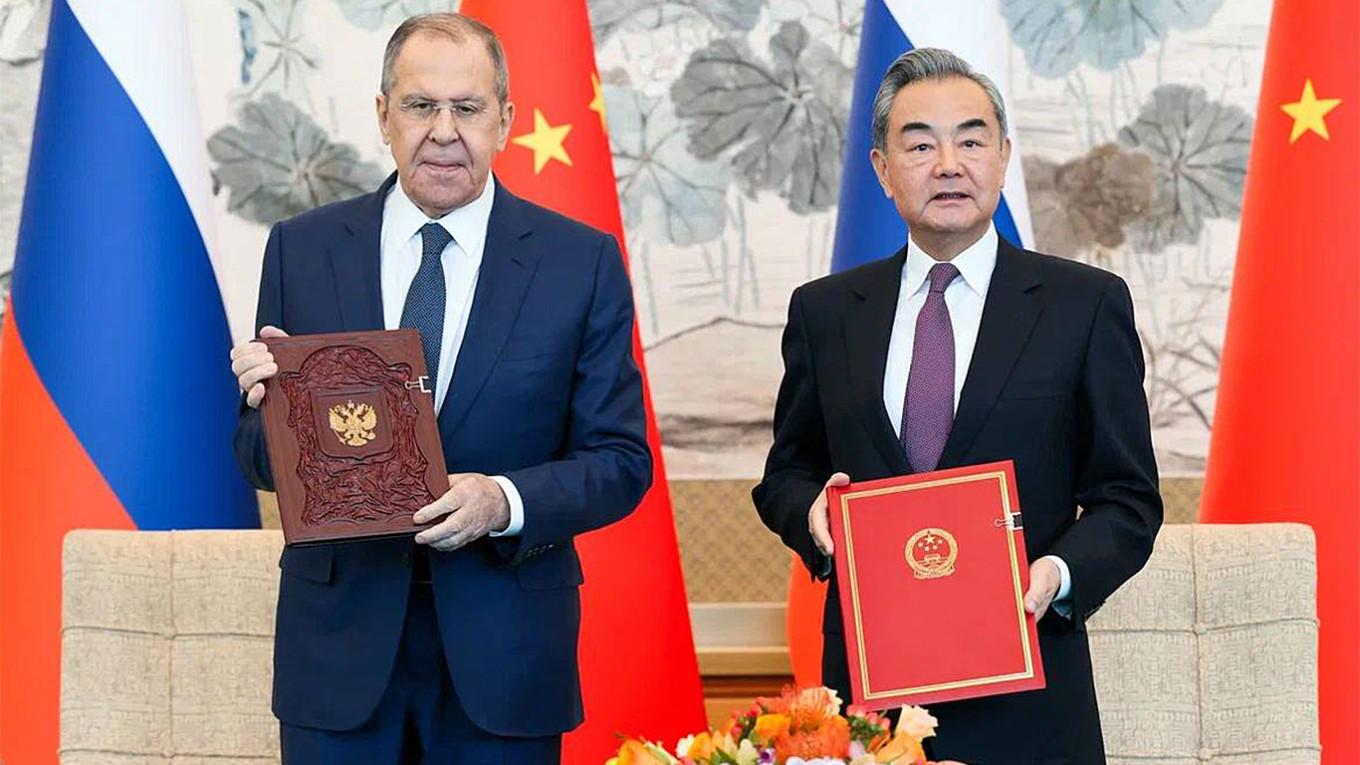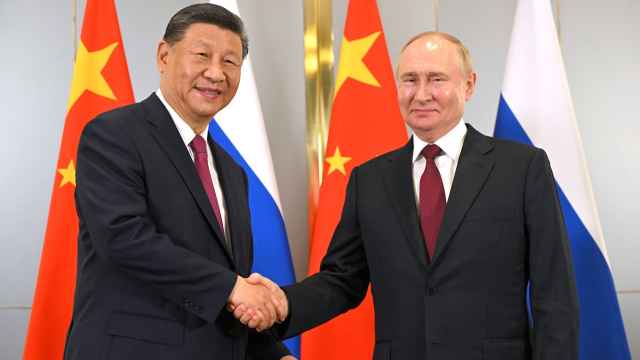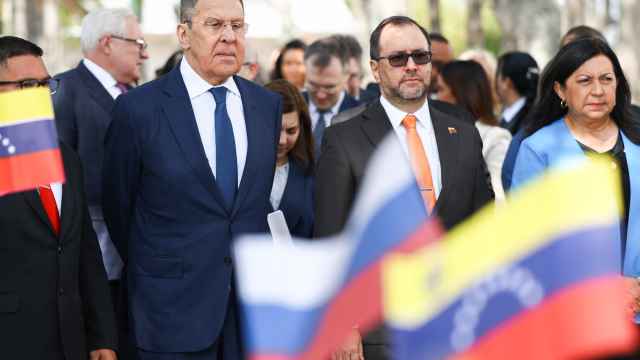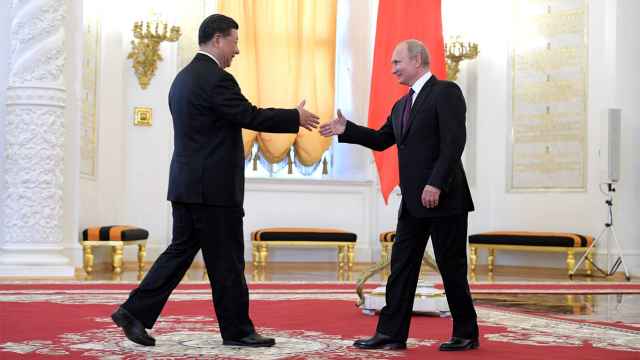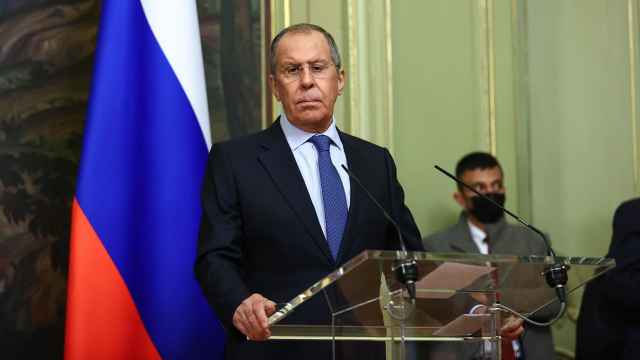China and Russia said Tuesday they would strengthen strategic cooperation as Moscow's top diplomat met President Xi Jinping in Beijing, further deepening ties as the war in Ukraine grinds on.
The two countries have in recent years ramped up contacts, and their strategic partnership has only grown closer since Moscow's invasion of neighboring Ukraine.
On the tail end of a two-day visit to China on Tuesday afternoon, Russian Foreign Minister Sergei Lavrov held talks with Xi.
"We would like to express our highest appreciation and admiration for the successes you have achieved over the years and, above all, over the past decade under your leadership," Lavrov told Xi, according to Russian news agencies.
For his part, Xi told Lavrov that China attached "great importance" to relations with Moscow and "stands ready, with Russia, to strengthen bilateral communication, [and] strengthen multilateral strategic coordination," according to Chinese state broadcaster CCTV.
Xi and President Vladimir Putin have agreed to maintain "close exchanges" to ensure the steady development of their ties, the readout said.
"China supports the Russian people to follow a development path that suits their national conditions, and supports Russia in combating terrorism and maintaining social security and stability," it added.
Earlier Lavrov met with his Chinese counterpart Wang Yi, where he thanked China for its "support" after Putin's recent re-election, in which he was unchallenged by any meaningful opposition.
The Russian minister noted that Xi was among the first to send congratulations.
"Beijing and Moscow will continue to strengthen strategic cooperation on the world stage and provide each other with strong support," Wang said, according to Russia's RIA Novosti news agency.
"Under the strong leadership of President Putin, the Russian people will have a bright future," he added.
'Vassalage to China'
Lavrov last visited Beijing in October for an international forum on Xi's flagship Belt and Road infrastructure initiative.
Analysts say China holds the upper hand in the relationship with Russia, with its sway growing as Moscow's international isolation deepens following its invasion of Ukraine.
That asymmetry is still "changing in China's favor" as it enables Moscow "to continue the war by providing very necessary materials for the Russian war machine," Alexander Gabuev, director of the Carnegie Russia Eurasia Center, told AFP.
"Integrating Russia's economy, brainpower, and military technology into... a Chinese-led order with Eurasia at its geographic heart, is the only way Russia can sustain its confrontation with the West," he wrote in Foreign Policy magazine this week.
"China has stronger bargaining power and many more options than does Russia, and its leverage over its northern neighbor is growing all the time," he added.
"Russia is now locking itself into vassalage to China."
'Unlawful sanctions'
U.S. officials have recently warned Beijing against providing indirect aid to the Russian war effort and regularly urge China to wield its influence to help bring about peace in Ukraine.
In Brussels last week, U.S. Secretary of State Antony Blinken told reporters that "China continues to provide materials to support Russia's defense industrial base."
And Treasury Secretary Janet Yellen, who wrapped up a visit to China on Monday, said she had warned officials of the consequences of supporting Russia's military procurement.
But Lavrov on Tuesday drew a parallel between the West's "unlawful sanctions" and efforts to curb China's access to sensitive U.S.-made technologies.
At a press conference following bilateral talks, he accused the West of seeking to impede China's "economic, technological development opportunities, to put it simply in order to eliminate the competitors."
Wang, in turn, declared that Russia and China "always stick to the correct path on great matters of principle."
"China and Russia must take a clear-cut stand on the side of historical progress, on the side of fairness and justice," he said.
"[We must] oppose all acts of hegemony, tyranny and bullying; oppose Cold War thinking and separatist provocations; and actively push for the construction of a common future for all humankind," he said.
"As a force for peace and stability, China will stick to playing a constructive role on the international stage... and will never add oil to the flames," he added.
A Message from The Moscow Times:
Dear readers,
We are facing unprecedented challenges. Russia's Prosecutor General's Office has designated The Moscow Times as an "undesirable" organization, criminalizing our work and putting our staff at risk of prosecution. This follows our earlier unjust labeling as a "foreign agent."
These actions are direct attempts to silence independent journalism in Russia. The authorities claim our work "discredits the decisions of the Russian leadership." We see things differently: we strive to provide accurate, unbiased reporting on Russia.
We, the journalists of The Moscow Times, refuse to be silenced. But to continue our work, we need your help.
Your support, no matter how small, makes a world of difference. If you can, please support us monthly starting from just $2. It's quick to set up, and every contribution makes a significant impact.
By supporting The Moscow Times, you're defending open, independent journalism in the face of repression. Thank you for standing with us.
Remind me later.


